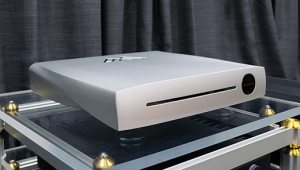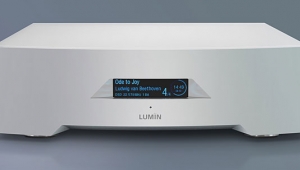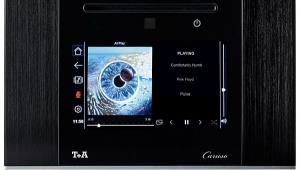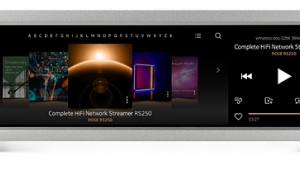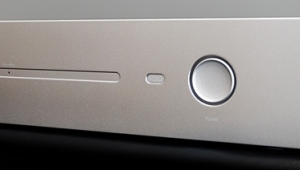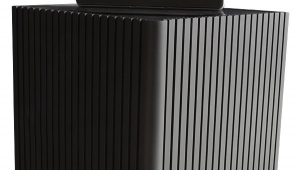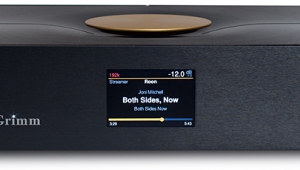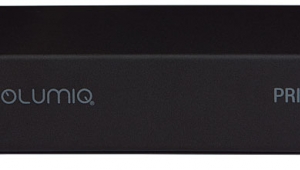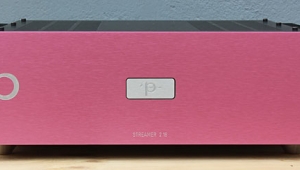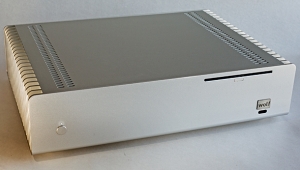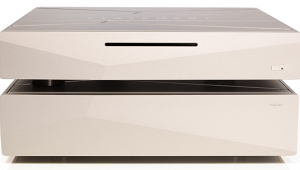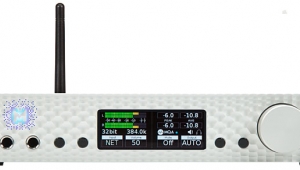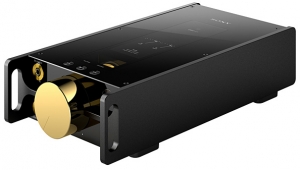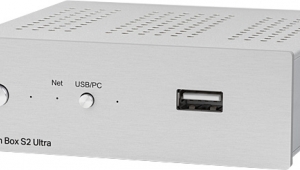| Columns Retired Columns & Blogs |
McIntosh MS750 music server Page 2
All in all, it was simpler than setting up a Slim Devices Squeezebox, which itself is pretty painless. I give McIntosh an A+ for initializing the system. After that, it was just a matter of feeding the MS750 music to digest. I didn't relish feeding the MS750 one disc at a time, but fortunately it has an S-Link connection, which allowed me to connect it to my S-Link–controlled Sony CDP-CX400 carousel CD player via the Sony's TosLink output. (Or you could use any RS-232–controlled disc changer via one of the MS750's RS-232 ports.) The Mac then ripped all the digital signals and metadata automatically, though it took some 350 hours (two weeks) to load all 400 discs—the Sony plays CDs only in real time.
It might be worth asking your dealer if he offers a CD-loading service. Apparently it's a growing market. Me, I'm cheap, and I had the Sony, so I loaded it myself and twiddled my thumbs for two weeks. McIntosh's Cornelius had another suggestion: teenagers. "For the same money you'd pay for a babysitter, hire a kid to feed a disc into the 750 every five minutes or so. Unless you have a huge collection, it won't take that many sessions."
Maybe, but I'm of the opinion that music servers make the most sense for those of us who do have huge collections. At FLAC resolution, the MS750 can store about 2700 CDs, which is an unwieldy collection of physical discs—but when those discs' contents are stored on a hard drive and organized by title, genre, artist, and playlist, it's a different story. That, to me, is the glory of a music server. I want it stuffed to capacity, because I'm tired of filing—or, more commonly, not filing—my CDs.
FYI, Mac
There are two minor usage points I feel compelled to make about the McIntosh—neither of them a cavil, really; simply observations. One concerns the cooling fan, which is generally unobtrusive, unless you sit nearly on top of the MS750. Periodically, however, it revs up and really goes to town, whether or not you're using the Mac at the time. Keeping the hard drive cool is essential to its longevity, so I guess it's a good thing, but sensitive listeners (and/or those with small rooms) may wish to place the MS750 where fan noise won't bother them. Because its interface lets you use virtually any touchscreen controller (or a WiFi-connected laptop), this shouldn't be a problem.
Also, classical listeners need to acknowledge that they're going to have to rewrite 90% of the metadata tags they harvest from Gracenote (AMG is no better). This is a legacy issue that goes back to the early days of the Schwann catalog, in which artist could mean several different things, from composer to soloist to orchestra.
Mackin' around
If you've ever used an iPod or other personal digital player (PDP), the MS750's learning curve will be almost flat. You can choose music by album title, genre, or artist in just a few keystrokes. I enjoyed exploring my library with the random-play feature, but you can also structure your listening a tad by specifying random play within a genre—a feature my wife, who doesn't like surprises, enjoyed.
Me, I delight in strange juxtapositions—as did many of my guests. John Atkinson asked, "What criteria did you establish to get some of those segues?" As people's eyes lit up in recognition, it almost became a game. Oh, what will the MS750 play next?
The real question is How good did the MS750 sound? As I said, I ripped all the music I stored on it as full-resolution FLAC files—results with lossy formats will necessarily suffer in comparison. In FLAC, I found it virtually impossible to detect any difference between the original CDs played on the MS750 and their stored FLAC versions. Well, I say virtually to salve my wounded pride. I wouldn't wager large amounts of cash on my consistent ability to discern the originals from the ripped copies.
Just a few days ago, I received a CD-R from Stephen Mejias, on which he'd compiled 17 of the classic salsa songs that have obsessed him lately. Su obsession est mi obsession, Esteban—I just can't stop listening to those tracks. Of course, inputting the music from a CD-R meant I had to enter the metadata myself, but it was so worth it.
The fat brass blats that open Willie Colón and Héctor Lavoe's "La Murga" are followed by an atomic rhythm section. What power, what precision—what fluidity! The call and response between Lavoe and the band had this decidedly gringo-hipped clod up and dancing across the room. Well, in my mind, anyway. The MS750 handled the ritmos with greater delicacy than I did.
The MS750 sounded warm, rhythmic, controlled, and exciting. And clear, don't forget its clarity—Celia Cruz's regal "Todos Somos Iguales," with Willie Colón, allowed me to hear the curl and burr of every magnificent r she sang.
With McCoy Tyner's new, reference-quality Quartet (CD, McCoy Tyner Music 4533), the MS750 delivered the power and depth of Christian McBride's double bass, while burnishing Joe Lovano's tenor saxophone to a brassy sheen. The McIntosh was fast, clean, and powerful.
There was a downside to that. Load nearly 400 CDs in the MS750 and you'll regularly be reminded that not every classic recording is recorded to be a classic. However, this has been the curse of the audiophiliac music lover since time immemorial. You have a choice: You can always delete the recordings that jar you out of your comfort zone and reserve the CD for playback only when you must hear that piece, or you can suck up the bitter with the sweet.
As attractive as I find the idea of having all of my music digitally archived and at my fingertips, I find I still need a discrete disc player. For one thing, I have hi-rez SACD and DVD-Audio discs that I haven't been able to digitize yet—the MS750 is CD only. That alone dictates that the Ayre C-5xe universal player still has a place in my system.
Something in the Ayre
But even without the hi-rez formats that can't be stored on the MS750, I'd keep the Ayre for serious listening. This might not surprise longtime McIntosh fans—one of them went so far as to predict, on www.audiokarma.org, that "audiophiles" would find the MS750 too "good sounding" to be a reference. He thought audiophiles prefer relentless resolution over good sound.
- Log in or register to post comments
